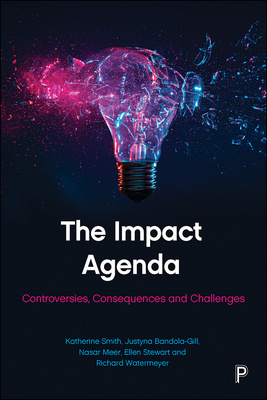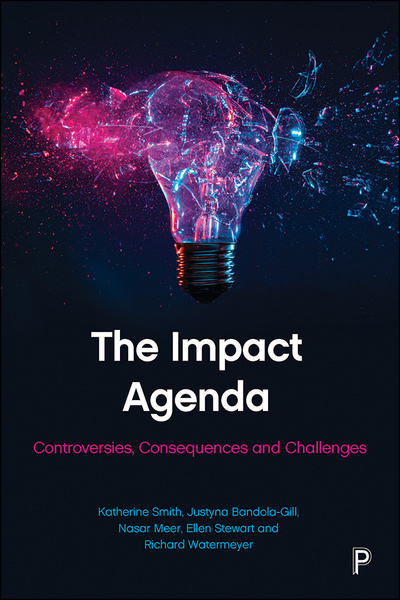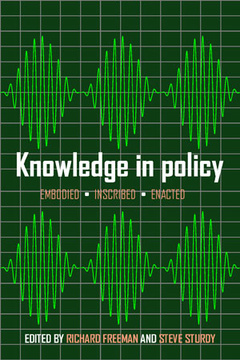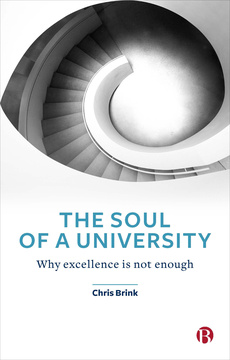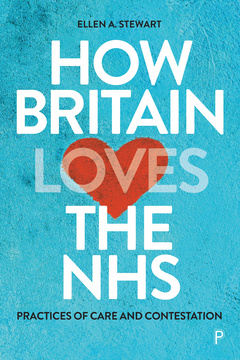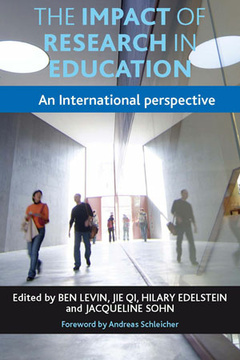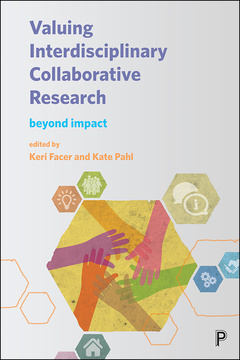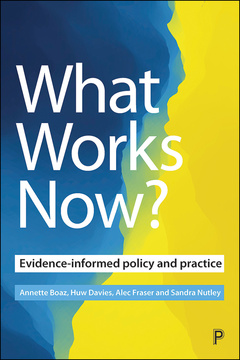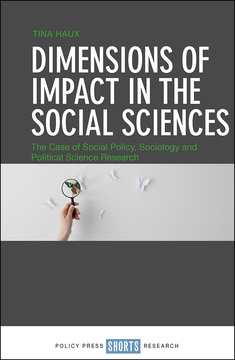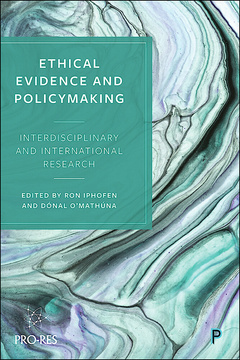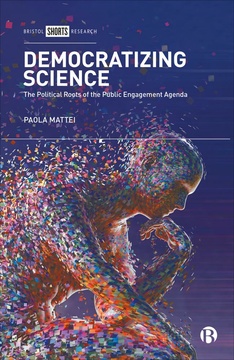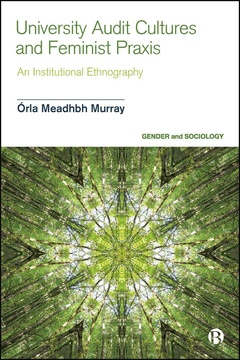The Impact Agenda
Controversies, Consequences and Challenges
By Katherine Smith, Justyna Bandola-Gill, Nasar Meer, Ellen A. Stewart and Richard Watermeyer
Published
May 13, 2020Page count
240 pagesISBN
978-1447339878Dimensions
234 x 156 mmImprint
Policy PressPublished
May 13, 2020Page count
240 pagesISBN
978-1447339854Dimensions
234 x 156 mmImprint
Policy PressPublished
May 13, 2020Page count
240 pagesISBN
978-1447339885Imprint
Policy PressPublished
May 13, 2020Page count
240 pagesISBN
978-1447339885Imprint
Policy PressIn the media
On our blog: The UK needs a new impact agenda
Measuring research impact and engagement is a much debated topic in the UK and internationally. This book is the first to provide a critical review of the research impact agenda, situating it within international efforts to improve research utilisation. Using empirical data, it discusses research impact tools and processes for key groups such as academics, research funders, ‘knowledge brokers’ and research users, and considers the challenges and consequences of incentivising and rewarding particular articulations of research impact.
It draws on wide ranging qualitative data, combined with theories about the science-policy interplay and audit regimes to suggest ways to improve research impact.
“[This book] seeks to bring together research about these policies into one critical discussion so as to highlight quite why it creates the controversies, consequences and challenges of the book’s subtitle. In doing so, the authors have undertaken three useful tasks that make reading it worth the time of anyone interested in this subject.” LSE Review of books
"This book stands as one of the first major discussions of the rise of research impact, the experiences and perceptions carried by academics of the push toward ‘relevance’ and the possible forms research-informed research agendas could take. Written by social scientists at the forefront of impact commentary, this should be essential reading for academics who not only navigate but want to shape this new environment." Claire A. Dunlop, University of Exeter
"In British universities we all live under the regime of the REF. Initially it was scholastic as all forms of public engagement and contributions to national debates counted for nothing. When rectification was proposed it was sad to see so many academics protest at the inclusion of ‘Impact’, which admittedly was introduced in a crude form and biased – like the REF itself – to STEM subjects and has rightly undergone progressive improvements. This book probes the nature and contours of this moving feast giving us all plenty of critical food for thought and international comparisons." Tariq Modood, University of Bristol
“A book that considers research impact in the real world, providing practical guidance on why it matters and how to make it happen.” Kamal R. Mahtani, University of Oxford
“The Impact Agenda draws together much of the research done on the institutionalization of impact in the UK. Its analysis of the debate around impact as well as the (possible) effects on working practices, drawing on interview material, is particularly rich and valuable. These chapters show that the impact agenda is indeed a multifaceted whole of which the inclusion of impact in the REF is a significant element but not the only intervention.” Minerva
Katherine E. Smith is a Professor of Public Health Policy at the University of Strathclyde and an Honorary Professor at the University of Edinburgh, where she is an active member of SKAPE (the Centre for Science, Knowledge and Policy at Edinburgh). Previously she held posts at the universities of Edinburgh, Bath and Durham. Kat has published extensively on the interplay between academia and policy, health policy analysis and interest group efforts to influence national and international policies. Kat was trained in Geography but has subsequently worked largely in Public Health and Social Policy academic settings.
Justyna Bandola-Gill is Research Fellow in Social Policy at the School of Social and Political Science at the University of Edinburgh. Justyna works at the intersection of Science and Technology Studies and Public Policy. Her research explores the interactions between research and policy, especially the ways in which knowledge is organised, governed and mobilised across different settings in order to achieve political goals. Currently, Justyna is working on an ERC-funded project exploring the global rise of a metrological fields (METRO: http://www.metro-project.eu/), where her research explores the production and governance of global poverty indicators by International Organisations.
Nasar Meer is Professor of Race, Identity and Citizenship in the School of Social and Political Sciences at the University of Edinburgh. His publications include: Islam and Modernity (ed, 2017); Interculturalism and multiculturalism: Debating the dividing lines (co-ed, 2016); Citizenship, Identity and the Politics of Multiculturalism (2015, 2nd Edition); Racialization and religion (ed, 2014), Race and Ethnicity (2014) and European Multiculturalism(s) (co-edited, 2012). In 2016 he was awarded the Royal Society of Edinburgh (RSE) Thomas Reid Medal for excellence in the social sciences, and in 2017 he was elected as a Fellow of the Academy of Social Sciences. He holds a Personal Research Fellowship with the Royal Society of Edinburgh (RSE) to study race equality in Scotland, and is Principal Investigator of The Governance and Local Integration Migrants and Europe’s Refugees (GLIMER) (ESRC and Horizon2020: 2017-2020).
Ellen Stewart is Chancellor's Fellow in the Centre for Biomedicine, Self and Society at the University of Edinburgh. She is a social scientist working at the intersection of medical sociology, health policy and public administration. Ellen is particularly interested in studying how health policy decisions accommodate and negotiate different forms of ‘lay’ and ‘expert’ knowledge, including demands for public engagement and for evidence-based policy. She has previously worked on projects exploring everyday practices of public involvement in the local NHS, new governance arrangements for Scottish Health Boards, and how health policymakers use research evidence and advocacy.
Richard Watermeyer is Professor of Higher Education in the School of Education at the University of Bristol and is a sociologist of educational policy, practice and pedagogy. His research is predominantly concerned with a sociological analysis of change in higher education as motivated and framed by currents of, and challenges to global capitalism and (the weakening of) its policy incantations. He is especially well known for his internationally comparative and critical analyses of public engagement and societal impact generation as valorised academic functions. He is the author of Competitive Accountability in Academic Life: The Struggle for Social Impact and Public Legitimacy (Cheltenham: Edward Elgar); co-editor of Pedagogical Peculiarities: Conversation at the Edge of University Teaching and Learning (Leiden/Boston: Brill/Sense); and is principal editor of the forthcoming Handbook on Academic Freedom (Cheltenham: Edward Elgar).
Introduction: critical reflections on research impact
The rise of research impact
Debating the UK impact agenda
Do experiences and perceptions of research impact vary by discipline?
Impact on whom? Contrasting research impact with public engagement
Public intellectualism and the impact agenda: international perspectives
Academic life in the impact vanguard: the view from knowledge exchange organisations
Looking back: evolving public health perspectives on research impact
Telling tales of impact: as seen through the eyes of user assessors
Conclusion: what would an evidence- informed impact agenda involve?







